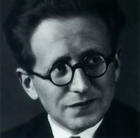
Hermann Ungar (Boskovice, Moravia, 1893 - Prague, 1929) German writer. Born into a Jewish family of the upper bourgeoisie, he obtained a doctorate in law from the University of Prague and began to work in the Czech Ministry of Foreign Affairs. During the First World War he was called up and wounded in the front. Between 1922 and 1928 he was secretary of legation in Berlin. His first texts, basically short stories, were published in 1920. From that moment he continued to devote himself to literature and, in addition to narrations, he wrote two novels and two plays, among which he undoubtedly stands out entitled The Red General (1928). Although he always remained outside the circle of great writers who at that time dominated the Prague scene (Max Brod, Franz Kafka and Franz Werfel, among others), there may be some concomitance between the work of Ungar and the one of the authors of the circle, especially the one of Kafka, as far as the parabolic style of its narrations and the description of the individual like victim of its own fears is concerned. For Ungar, man is always the prisoner of his sexual and pathological obsessions, as can be read in Children and Killers (1920), The Mutilated (1923) and The Class (1927). Ungar did not have much acceptance in his time, and the only one that decidedly decided in favor of its work was Thomas Mann, who was always impressed by its texts. Nevertheless, rediscovered in the decade of the sixties, Ungar became the center of a discussion of psychopathological rather than literary character.




